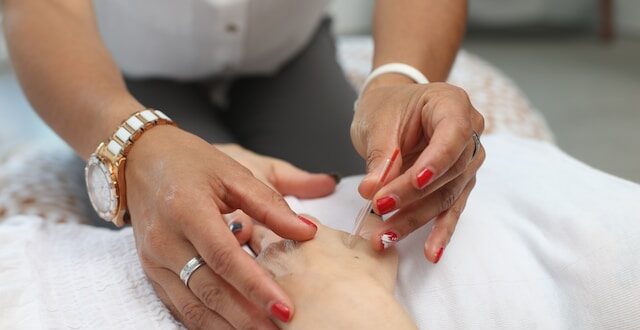Acupuncture and Peripheral Neuropathy Relief
Peripheral neuropathy occurs when the peripheral nerves become damaged. This condition often causes pain, numbness, and weakness, typically in the hands and feet. It can also affect other parts of the body and cause digestive disorders and urinary problems.
It is estimated that peripheral neuropathy affects more than 20 million Americans. There are several types of peripheral neuropathy including carpal tunnel syndrome – an injury often resulting from prolonged, repetitive use of the hands and wrists.
Mononeuropathy vs Polyneuropathy
Mononeuropathy occurs when a single peripheral nerve becomes damaged. The primary cause is usually physical injury or trauma, often due to accidents. Carpal tunnel syndrome, ulnar nerve palsy, radial nerve palsy, and peroneal nerve palsy are some common forms of mononeuropathy.
Polyneuropathy happens when several peripheral nerves in the body malfunction simultaneously. Various factors can cause it, including exposure to certain toxins. One of the most common types of polyneuropathies is diabetic neuropathy, which tends to have a severe effect on people with uncontrolled diabetes (alarmingly high blood sugar levels).
Effects of Chronic Polyneuropathy
Polyneuropathy affects a person’s ability to feel pain or changes in temperature. As a result, they are more likely to hurt themselves and not know it. People with polyneuropathy often develop open wounds from injuries or extended pressure. If the nerves that connect the organs are affected, diarrhea or constipation can occur.
Chronic polyneuropathy can also lead to loss of bladder or bowel control. Other potential consequences include sexual dysfunction and unusually low blood pressure. In a worst-case scenario, polyneuropathy can cause Guillain Barre Syndrome – a disease in which the body’s immune system attacks the peripheral nerves.
What Causes Peripheral Neuropathy?
While peripheral neuropathy can be genetic, more often than not the condition is acquired.
Here are some common causes of peripheral neuropathy:
- Diabetes: Studies show that around 50 percent of diabetics have some type of nerve damage. Diabetics should monitor their blood sugar levels and check their feet regularly for signs of infection or injury. Any abnormalities should be reported to a doctor immediately.
- Injuries: Injuries can cause nerve damage. A sedentary lifestyle or holding still too long in a position can also lead to neuropathy.
- Health conditions and disorders: Tumors—cancerous as well as non-cancerous growths —can press on nerves causing neuropathy. Kidney and liver diseases can also cause some types of peripheral neuropathy.
- Infections: Viruses such as herpes simplex, varicella-zoster virus (causes chickenpox and shingles), and Epstein-Barr virus can damage sensory nerves, leading to severe bouts of sharp pain. If not treated, bacterial infections such as Lyme disease can also lead to nerve damage.
- Medications: Someblood pressure medications, anticonvulsants, medications used to treat bacterial infections, and cancer drugs may also cause nerve damage.
- Alcohol use disorder: Because alcohol can cause serious damage to nerve tissues, alcoholics are at high risk of peripheral neuropathy.
- Toxins: Exposure to harmful chemicals used in glues, solvents, or insecticides can lead to nerve damage.
Symptoms
Peripheral neuropathy can affect one nerve, a set of interconnected nerves, or numerous nerves spread across different parts of the body and can be classified into three major groups – sensory neuropathy, motor neuropathy, and autonomic neuropathy.
Sensory Neuropathy
As the name implies, sensory neuropathy affects the sensory nerves. It’s common symptoms include:
- Hypersensitivity
- Diminished sense of vibration and touch
- Burning, stabbing, or shooting pain that gets worse at night .
- Balance problems
Motor Neuropathy
Motor neuropathy affects the muscles controlled by the brain. Symptoms include:
- Muscle weakness, which can cause involuntary and rhythmic shaking when performing simple everyday activities such as buttoning a shirt or tying shoelaces.
- Cramps
- Muscle shrinking, twitching, and wasting
Autonomic Neuropathy
Autonomic neuropathy affects body processes that the brain controls involuntarily. Some common symptoms of the condition are:
- Loss of bowel or bladder control
- Heat intolerance which leads to excessive or a lack of sweating
- Difficulty swallowing
- Blood pressure problems
How can Acupuncture Help?
Believed to have originated in China, acupuncture is a key component of Traditional Chinese medicine. It involves inserting specially designed thin needles into different points (known as “acupoints”) on the body to balance the flow of energy or life forces.
Many people with peripheral neuropathy turn to acupuncture to manage their condition. Studies show that acupuncture can reduce the symptoms of peripheral neuropathy by relaxing the affected muscles and altering the way pain signals are perceived by the brain. If you are looking for acupuncture in Walnut Creek, reach out to Monarch Acupuncture. Our experts are on hand to support you through your health concerns.
Traditional Chinese Medicine (TCM) experts believe that peripheral neuropathy is caused by “dampness” which leads to poor circulation of Qi and blood in the limbs. Acupuncture aims to address the root cause of the dampness and heal energy blockages, so Qi and blood can move freely.
A skilled acupuncturist can offer tailored dietary recommendations to address specific conditions impacting your nervous system’s health. They may also recommend nutrient-rich herbs that restore the body’s ability to repair itself.
In a 2007 study, participants were divided into two groups. One group received acupuncture, whereas the other group received traditional treatment. At the end of the study, researchers reported that acupuncture as an alternative treatment relieved the symptoms of peripheral neuropathy for more patients in the first group than those in the second group.
In another study, participants (Type 2 diabetes patients) were divided into two groups. Participants in the first group were given medications, while those in the second group also received acupuncture. The group that received acupuncture demonstrated significantly better results than the group that only used medications. Participants in the acupuncture group reported improvement in their symptoms and their disability scores improved as well.
At Monarch Acupuncture & Wellness we are committed to helping people get their health back on track. Our acupuncturists use a wide variety of TCM techniques to identify and address the root causes of health problems. To make an appointment, click here.


